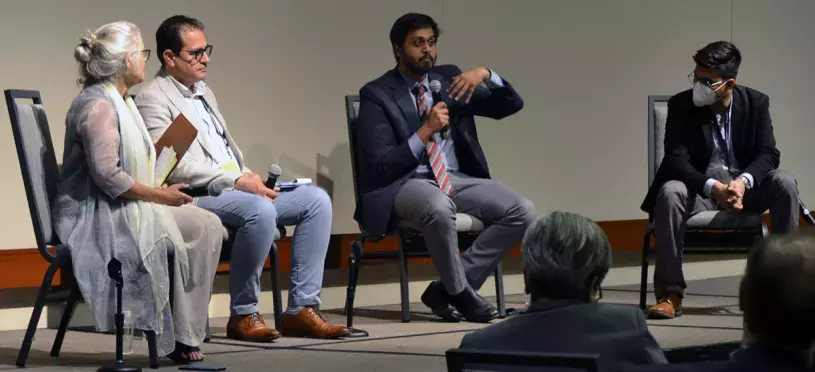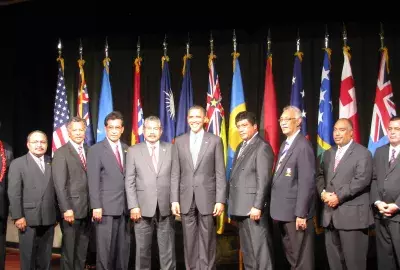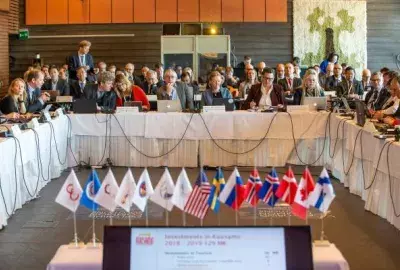Error message

OFFICE/DEPARTMENT
Journalists on a free press 'state of emergency' panel at the recent EWC International Media Conference open up about life as a target
HONOLULU (June 31, 2022) – Reporters covering Myanmar, Afghanistan, India, and Eastern Ukraine came together in a session at the East-West Center International Media Conference this week to discuss how journalists are coping with oppression of free speech. The panel “Journalism in a State of Emergency” was moderated by documentary filmmaker Jocelyn Ford, former chair of the Media Freedoms Committee of the Foreign Correspondents Club of China.
Parwiz Kawa, news editor for Afghanistan International Television in Washington D.C., explained how his life changed drastically when the Taliban took over Afghanistan last year and he and his staff had to flee from their homes. Kawa explained that now he is only able to report the truth from exile in the United States.
“That was a really difficult time,” he said. “You had to work day and night to make sure your staff is safe, and is being evacuated from the country. We know that the Taliban will simply kill us, and it was really hard.”
Meghnad Bose, deputy editor for The Quint in India, explained that his life as a news reporter in the current environment there should be considered comparatively “privileged” because he is both “a man and a Hindu.” But that still has not excluded him from being attacked by political forces.
Bose said he was alarmed that human rights activists and fact-checkers in India are being arrested more frequently for simply exercising their free speech rights, citing the case of Mohammed Zubair, co-founder of one of India's first fact-checking platforms who was recently arrested by the New Delhi police on what Bose said were “completely trumped-up charges.” Cape Diamond, a freelance journalist and documentary film producer from Myanmar who uses an alias for safety, explained that reporters in his country cannot call themselves journalists because that label can be dangerous. “More than 90 percent of my journalism colleagues and my friends…were forced to flee the country,” with many having to cross the border illegally, Diamond said, his frustration and pain evident in his voice.
Paul Ronzheimer, who reports on the war in Ukraine or Germany’s Bild-Zeitunge newspaper said he recently had been only 200 meters away from bombing at a shopping mall. He is in constant fear, he said, but not as much for himself as for his local colleagues.
Especially in the first days of Russia’s push into the country, he said, “I didn't feel safe. But still, you know, I would say as a German journalist with a German passport, I was much safer than my Ukraine colleagues” who were on the ground, helping global media cover the story.
One ray of hope for journalists under attack is knowing they’re not alone. While India’s Bose said that as of now he sees “no light yet” for press freedoms in the country, he remains confident that “...our fellow citizens realize that what's happening is wrong, and that a free press is indeed vital for our democracy.”
— by Leilani Contreras Del Toro, University of Hawaiʻi at Mānoa
Journalists on a free press 'state of emergency' panel at the recent EWC International Media Conference open up about life as a target
HONOLULU (June 31, 2022) – Reporters covering Myanmar, Afghanistan, India, and Eastern Ukraine came together in a session at the East-West Center International Media Conference this week to discuss how journalists are coping with oppression of free speech. The panel “Journalism in a State of Emergency” was moderated by documentary filmmaker Jocelyn Ford, former chair of the Media Freedoms Committee of the Foreign Correspondents Club of China.
Parwiz Kawa, news editor for Afghanistan International Television in Washington D.C., explained how his life changed drastically when the Taliban took over Afghanistan last year and he and his staff had to flee from their homes. Kawa explained that now he is only able to report the truth from exile in the United States.
“That was a really difficult time,” he said. “You had to work day and night to make sure your staff is safe, and is being evacuated from the country. We know that the Taliban will simply kill us, and it was really hard.”
Meghnad Bose, deputy editor for The Quint in India, explained that his life as a news reporter in the current environment there should be considered comparatively “privileged” because he is both “a man and a Hindu.” But that still has not excluded him from being attacked by political forces.
Bose said he was alarmed that human rights activists and fact-checkers in India are being arrested more frequently for simply exercising their free speech rights, citing the case of Mohammed Zubair, co-founder of one of India's first fact-checking platforms who was recently arrested by the New Delhi police on what Bose said were “completely trumped-up charges.” Cape Diamond, a freelance journalist and documentary film producer from Myanmar who uses an alias for safety, explained that reporters in his country cannot call themselves journalists because that label can be dangerous. “More than 90 percent of my journalism colleagues and my friends…were forced to flee the country,” with many having to cross the border illegally, Diamond said, his frustration and pain evident in his voice.
Paul Ronzheimer, who reports on the war in Ukraine or Germany’s Bild-Zeitunge newspaper said he recently had been only 200 meters away from bombing at a shopping mall. He is in constant fear, he said, but not as much for himself as for his local colleagues.
Especially in the first days of Russia’s push into the country, he said, “I didn't feel safe. But still, you know, I would say as a German journalist with a German passport, I was much safer than my Ukraine colleagues” who were on the ground, helping global media cover the story.
One ray of hope for journalists under attack is knowing they’re not alone. While India’s Bose said that as of now he sees “no light yet” for press freedoms in the country, he remains confident that “...our fellow citizens realize that what's happening is wrong, and that a free press is indeed vital for our democracy.”
— by Leilani Contreras Del Toro, University of Hawaiʻi at Mānoa
Web Article
Recent online articles and analysis that have been published on the East-West Center website.







